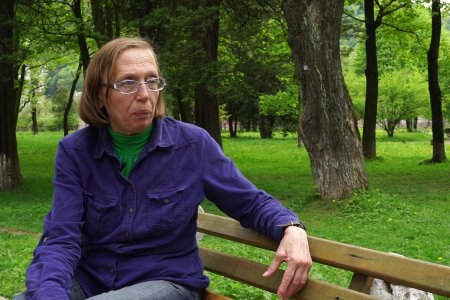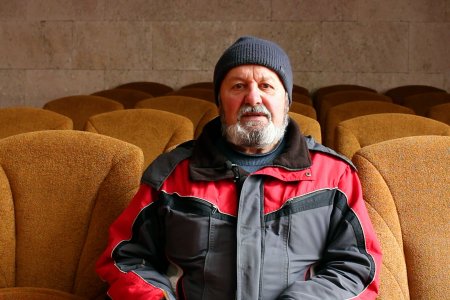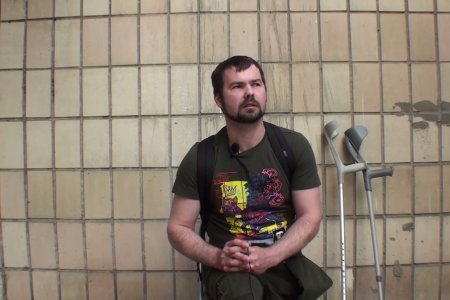When it all started, I couldn’t even think that in the 21st century, people are capable of such cruelty towards a neighboring country, which they considered brotherly — to come and kill. I’ve been through a lot. Until recently, I sat at home, thinking our guards would cope with the invaders who came to Bucha. But how wrong I was. My adventures, so to speak, began on 4 March when the occupiers came to the glass factory. I woke up in the morning (I have a second floor) and looked down from the window — soldiers with machine guns and St. George ribbons on their uniforms were walking around, checking passersby. I realized this was it.
I then sat at home as quietly as a mouse. It both saved me and didn’t. The occupiers came in the evening, somewhere around 17:00, knocked on the door, and said: “Open up or it will be worse.” They tried to break down the door, but they failed. I gave no sign that I was in the apartment. And then they tried to break down the door with a machine gun: they shot at the door and the locks. But, thank God, my door survived. The locks jammed, and I was left in the apartment, believing I survived my death.
This, of course, is unpleasant to remember because I was already saying goodbye to my loved ones. Back then, there was still an Internet connection, and I just sent voice messages to my parents that I loved everyone, hugged everyone, and said goodbye. Thank God they didn’t get to me then. On the fourth of March, I sat quietly, and on the fifth, I no longer saw them from the window. I decided to wait another day to make sure everything was quiet. On 6 March, everything was calm and normal. On 7 March, I tried to get out of my apartment through the balcony. It was in the morning, at about seven o’clock.
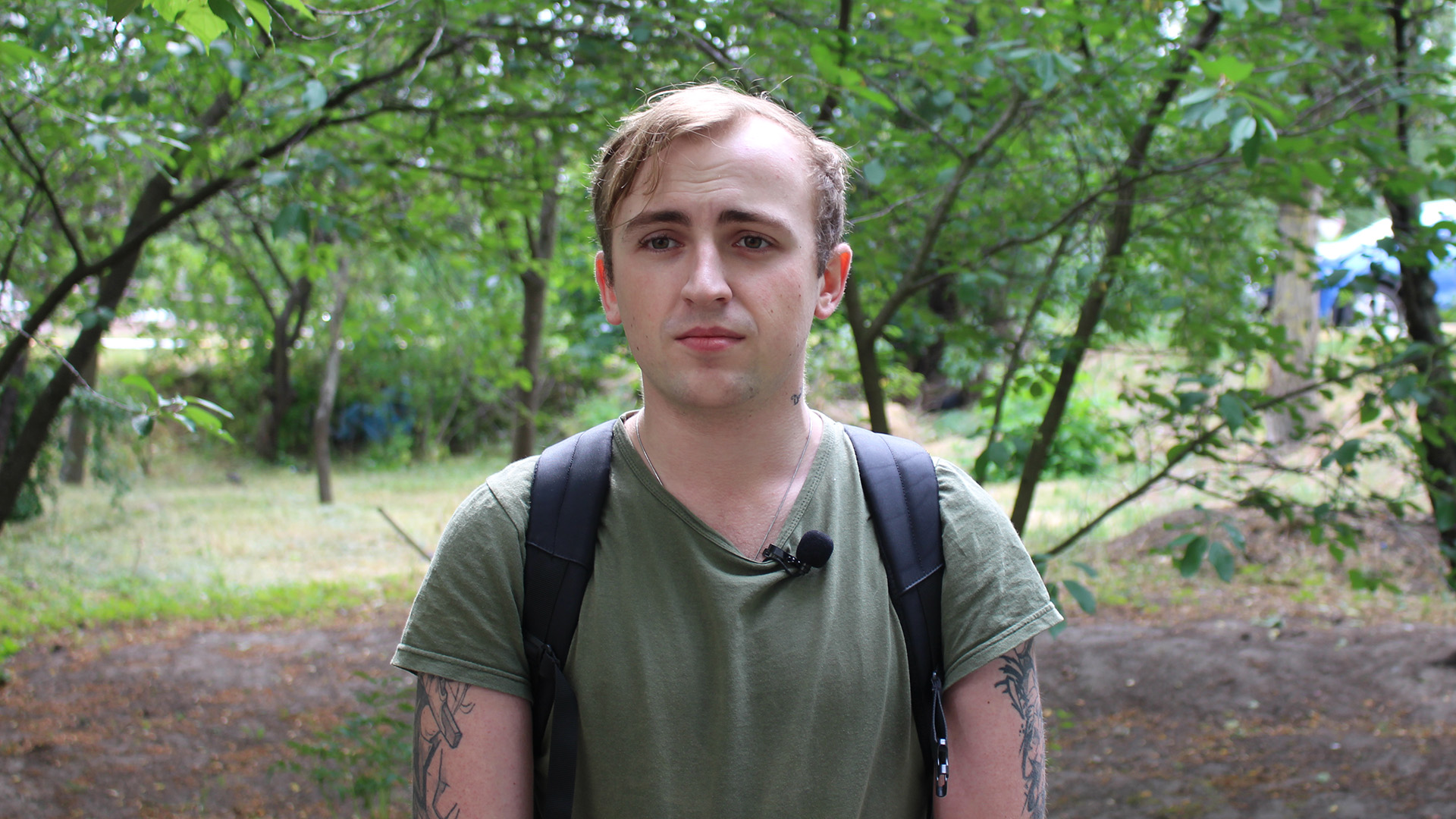
I went onto the balcony, and my neighbors came out from below. I realized there was no one because they walked around. I called them: “People, help me get out of the apartment.” They put a ladder under my window and threw a rope. I started asking them: maybe someone was leaving because I wanted to go to Kyiv and Khmelnýtskyi. Why to Khmelnýtskyi? Because I come from Western Ukraine, from Khmelnýtskyi. But, unfortunately, there was no one. It was impossible to return to the apartment. Therefore, I decided I just needed to go to the “bridge of life” from Irpіn to Romanivka and then to Kyiv. I walked around my area a little and talked to people. Nobody was going anywhere. I asked where the invaders were standing to get around them somehow. It was the seventh of March.
I walked past a metal warehouse where civilians were being shot. They took hostages and shot them.
I saw an armored personnel carrier there. I just noticed that it was there, and the occupiers. So I turned from there onto the railroad. And along this road, I went to the Bucha station. There, I met another civilian who also wanted to get out of Bucha because his house had been hit by a rocket. Still, it’s easier together than alone, so we grouped up. His name was Maksym Bondarenko. He, like me, was young — 26 years old.
He and I did not reach the Bucha station. Because there were already occupiers there. This was around 10:00-11:00 (give or take). From the station, we returned to the crossing to Yablunska. There, I saw our military wrecked checkpoint. We saw traces of the occupiers and the corpses of our army. From there, we walked by the Bucha military registration and enlistment office. Civilians were walking around, and everything was more or less quiet. From there, we entered the field. There was a road among the streets leading to the field. Through the field, you can walk across a metal bridge to Irpen. We got to Synerhiia and met civilians who said the invaders had settled in private houses near Synerhiia. If you walk straight along Universytetska, you can get out.
We walked through Irpin. There were shellings, and we saw corpses, both civilians and military.
The atmosphere was definitely unpleasant. It is very unpleasant when you can be killed. It was about noon when we reached the exit from Irpin.
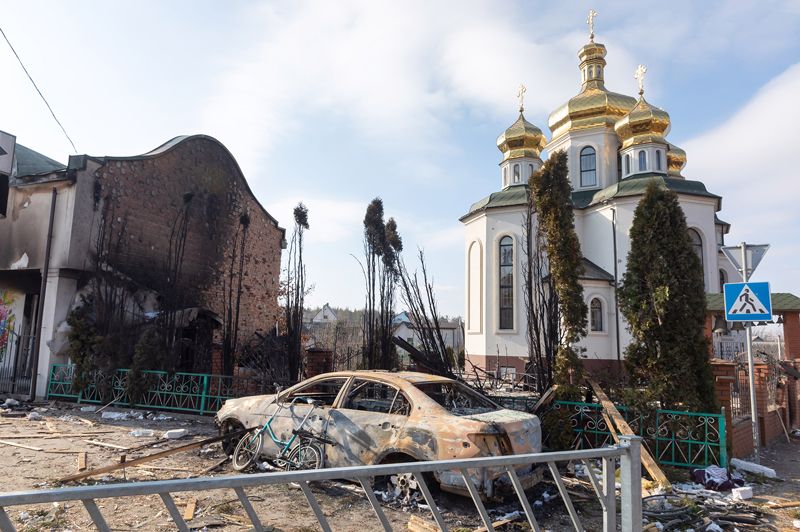
However, the Russian occupiers were already there. So we tried to get around them. Through Synerhiia, across the road to Zabuchchia. We bypassed them, roughly speaking. We went into the forest, walked around Irpen, and came out to Stoyanka: the locals call it a water canal. It is a town near the “bridge of life”. It was approximately 15:00-16:00, and the curfew started at 17:00. Therefore, we asked civilians to spend the night and evacuate from Irpen over the bridge the next day. But the locals did not accept us because they were afraid. Maksym and I found an unfinished house in which the door was open. We spent the night there on plywood, under shelling. It was tough to sleep at those moments. But from the sounds of the rockets, one could understand how long it would take to go off.
We woke up the next day, 8 March, at 8:00 a.m. and had breakfast. Then, we headed towards the “bridge of life”. But on the way, we were met by invaders. They had a roadblock or something. Near the kindergarten “Smiley”. We saw them but thought we could get through to evacuate. We found white garbage bags in unfinished houses and took them as a white banner so we wouldn’t be shot. We lifted it up and just walked. The invaders noticed us and ran towards us with machine guns. They asked: “Who are you? Where are you going?” “We are going to the bridge of life,” — we answered, of course, in Russian. They said there was no evacuation and no agreement. They asked us for our phones, and we handed them. They started checking phones and our things, turning everything inside out.
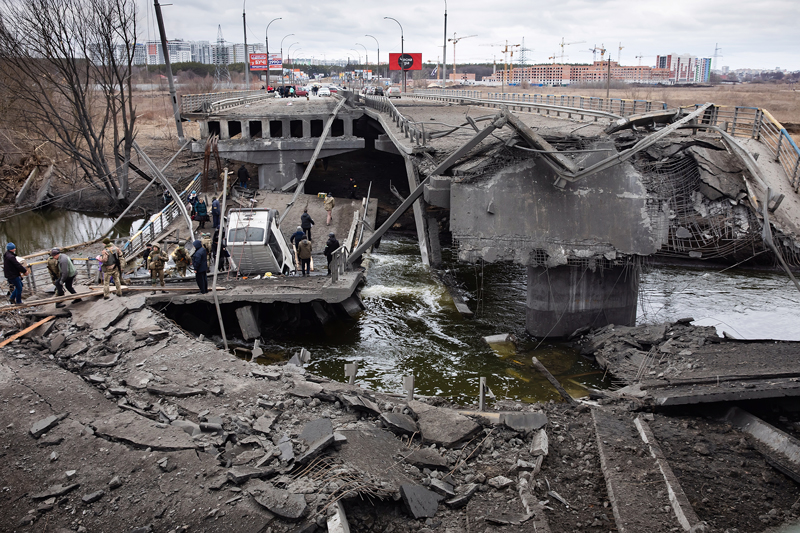
They said that we were lookouts, helping to aim shells at them. “Hands behind your back, hat over your eyes.”
It was cold and snowing then. We were led to their location with hands behind our backs and hats over our eyes. I don’t know where exactly because I didn’t see anything. There, we were both forced to our knees. They asked: who, where, what are we doing here, where are we going? They pointed machine gun barrels and knives at us. They threatened to cut off my ears, nose, and fingers. They struck me hard to make me talk. After they finished interrogating us, their commander said: “We are sending them to the base, where the commander will decide what to do with them.” We were put on an armored personnel carrier and taken to the forest — I don’t know where exactly. Because the car was closed, I couldn’t see anything. At the first base, we were interrogated individually — First Maksym, then me.
They threatened to cut off my arms, legs, ears, nose, and tongue. They beat me again. They also said: “If you don’t talk, we will force you to cut off each other’s legs with a saw.”
It was terrible. It’s horrible when you are on your knees, and everyone tells you these threats, when your nose and face are broken, and tears and blood are flowing. When they finished interrogating us, they took us to another base. As I later understood, the base was near Lubianka in the forest. We were brought there at about 16:00-17:00, it was already evening. There, we were interrogated one by one. Maksym was taken 50 meters away, so I could not hear anything. They questioned him for about 20-30 minutes. Then I heard a shot. The occupier, looking after me so I would not run away, said: “That’s it, your friend was shot, so remember everything to survive.” They took me, put me on my knees, and raised my hat so that I could see the people. They were all wearing balaclavas, so I couldn’t identify anyone.
They asked questions: “Who are you? Where are you from? Where were you going? They asked about the location of our troops, which I didn’t know at all; I didn’t even see them. They asked what we were armed with. They had suspicions that I was a spotter. That’s why they asked where my weapon was. That was strange — what weapon?! When I was interrogated for the first time, no weapons were found, but here they asked again. They asked if I knew Maksym and for how long. I said I didn’t know him, but they confronted me with a fact: he allegedly said we trained together at the Zhytomyr NATO military base, and we are specialized spotters. It was only later that I realized they wanted to intimidate us, but then it was scary.
I later realized I was standing in front of the hole where Maksym lay dead. They threw me at him, and I thought he was dead.
They pointed the machine gun barrel at me and said: “Speak if you have something interesting to say.” I didn’t know what to say at all. I didn’t know, I just didn’t know. But I wanted to live. Thank God they didn’t shoot me then; they just pulled me out of the hole. And then they asked stupid questions. At this time, Maksym was quietly taken out of the pit and led into another pit, where we later stayed like prisoners. My interrogation ended, and I was brought to Maxim. I was so glad he was alive, that I was not alone here, and he was not shot. Did they feed us? Yes, we were fed twice a day, morning and evening. They fed us what they ate themselves. It was borscht diluted with water, rice, and buckwheat porridge. Again, they asked if we were military. Maksym had some issues with his health, and I don’t remember what, and at that moment, I thought of lying that I had heart problems. I had a first aid kit and some pills for everything in my backpack, so I lied that I had heart problems — I was not fighting. And it helped me out.
Sitting in the pit was terrible. It was snowing. There is no roof over your head, and you are in a 3*3 meter hole where you are allowed to light a fire to keep warm at night.
Of course, this fire was not enough for the whole night. Maksym and I huddled close to each other to keep warm. They watched us when we sat in the pit—one or two military men. In the morning, they told us they would bring us tea and food to keep us warm. And it helped. We sat waiting all day. When the food was brought, we were told that the commanders would come to us the next day. And if you can remember something interesting, tell us when they arrive. But we just sat in the pit all day, burning a fire. And they didn’t do anything. On the morning of 10 March, we were released, “not released, but dismissed,” as they said. We got ready, we only had clothes, and that was all. All we had was my backpack and our documents. We were taken to the forest with all this.
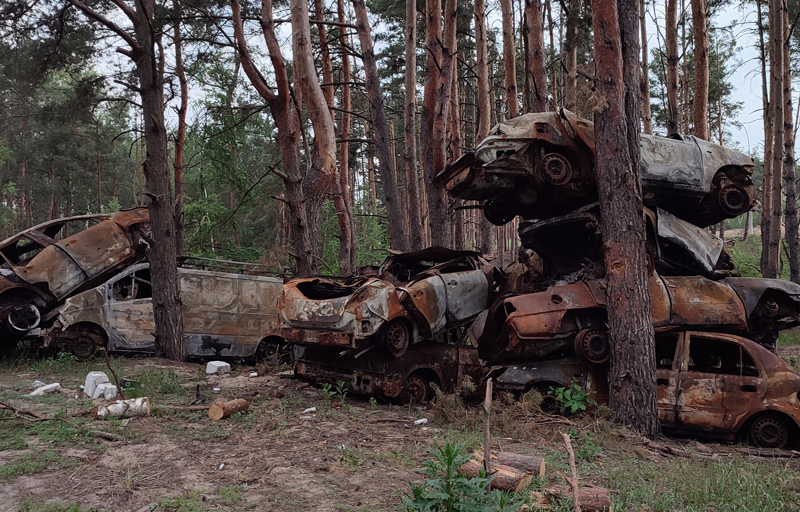
Before that, they tied our hands, covered our eyes with hats, and took us away in the trunk of some kind of equipment — I don’t know what kind. The machine gun barrel was pressed to my rib all this time, so I would not rock the boat or do anything as if I wanted to do something. We drove for about 20 minutes, give or take, and were released into the forest.
They untied our hands, lifted our hats, and said: “Run forward, raise your hands, and run, don’t look back. If you turn around, we’ll shoot you.”
“If our people ask you who let you go, say — Dagger let us go.” And we just ran. I’ve probably never been so happy that we got our lives back. Although all this time, I expected it would all end now. There were constantly such thoughts. Following the sun, we ran out of the forest to Lubianka, a village on the outskirts. We approached the first house we saw and learned from the locals that there were occupiers in town: Kadyrov’s [Chechen] people were walking around and gathering men. They checked phones and documents, looking for military personnel. We had nothing, and we didn’t know where to go, maybe to Bucha and then to Kyiv again. There were no other ideas. The locals gave us some food and drink. It was cool because we weren’t fed at all in the morning. We tried bypassing Lubianka from different sides to get to Bucha. But everywhere, everything was visible to the [Russian] military. Therefore, in desperation, we tried to go through the checkpoint in the center of the village. Luckily, there was a green corridor there.
We met the military at the checkpoint, who took us from their base. They were surprised. And they said: “What, did you want to come to us? Did you like it? Sit down, wait five minutes; we’ll finish with the guys and take care of you.” At that time, they were checking the documents of the children from this village. We sat and waited. And we saw civilian cars driving through the corridor, so we asked them to put us there. Fortunately, they stopped the car and put us in. And we went with them from Lubianka to Khmelnytskyi. By the way, the Russians took our credit cards and passports. The next day, I restored the SIM card in Khmelnytskyi. I reinstated my phone and contacted my loved ones, relatives, and friends. For everyone, it was like I had risen from the dead. It was quite something to experience.
